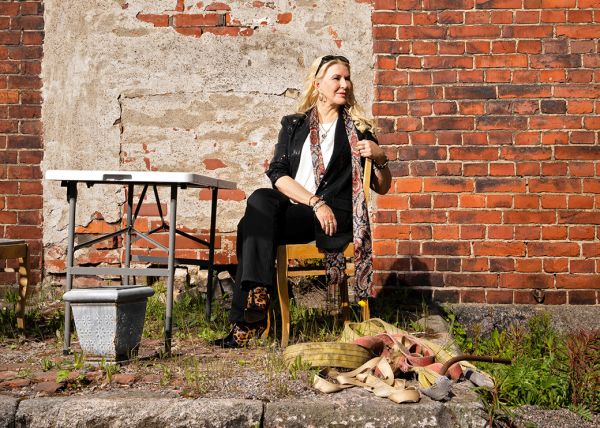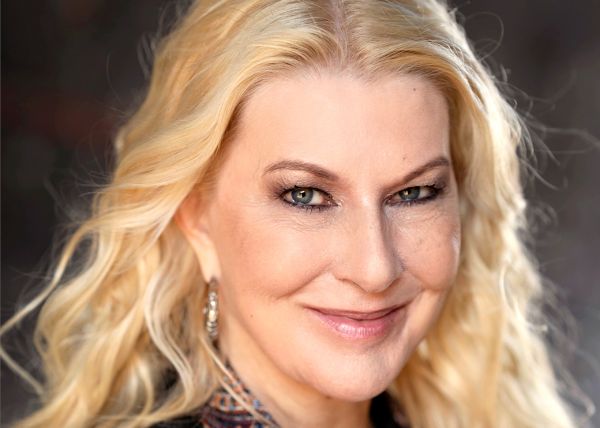
Doctor of Work Psychology Helena Åhman: Difficult situations have the seed of learning something new
Doctor of Work Psychology Helena Åhman specialises in facing high-pressure situations and trusts the enriching nature of disagreements and options.
Text Minna hiidensaari English translation: Marko Saajanaho images miika kainu
How to prepare for a high-pressure encounter?
“I recommend focusing on the state you enter the conversation in. A thought in your mind can be seen and heard in your tone of voice and facial expressions. Small things have a big significance”, Doctor of Work Psychology Helena Åhman advises.
Åhman reminds us that tuning your own state of mind also involves physiology. If a threat reaction is triggered in you, it affects your breath, for example. When the body tenses up and you are short of breath, your thoughts stall as well.
That is why it is useful to observe how to make yourself feel as safe as possible. Then you can make yourself as safe to others as possible. This makes it easier to open conversations.
What if we are suddenly thrust into a difficult situation? If you have not thought about the matter beforehand, your attacking, defensive, or freezing reaction can easily take control automatically. ’
When the situation is calm, it is a good idea to pre-emptively answer the following question: “If I end up in a difficult situation, what are my options and what can I do?”
The first thing is to recognise what is happening and calm down your body by breathing.
“In a difficult moment, you can ask for a timeout, observe the situation in your mind from a distance, ask a pre-meditated question. There are many options, but all require practice. Good preparation often means thinking about options instead of sticking to a plan.”

The unpleasant hides the opportunity for something new
Difficult situations require honesty and authenticity.
“In those situations, you should dare to be true with your own feelings and while communicating. It’s like being in a sandstorm. Unpleasant, but if you don’t run away from your discomfort and calm yourself instead, you can find new opportunities in the situation”, Åhman compares.
Facing difficult situations and training yourself to handle them are part of one of Åhman’s fields of specialisation – conversational intelligence. Åhman is quick to emphasise that this does not mean always managing to say something clever or always having to behave in a controlled manner.
Conversational intelligence and mind leadership in high-pressure situations are more like a group of skills that can be developed: preparation, observation, and communication skills. The crucial aspect is being able to maintain your connection to yourself and others.
“We all have had moments when we didn’t say the right thing at the right time, said the wrong things, or just didn’t say anything even though we should have.”
According to Åhman, the mind is structured in such a way that it may drive us away from unpleasant experiences in troublesome situations. However, it is these seemingly difficult situations that contain the seed of learning something new.
As a good example of this, Åhman mentions psychology professor Adam Grant, who requests feedback even when he knows the conversation has gone poorly. Processing your own negative experiences afterwards is also an important part of these skills.
Dare and be creative
Åhman has extensive experience in the development of board and administration work. One of the tools in her arsenal is meeting observation. An external professional’s notes may be more palatable when they concern matters the team itself does not see or dare to bring up.
“For example, the atmosphere may be different before the meeting and after the official opening. There are phenomena everyone sees but no one mentions aloud.”
”There are phenomena everyone sees but no one mentions aloud.”
Åhman has noticed that in high-pressure negotiation situations, one of the most classic mistakes is to operate from a narrow point of view that is focused on finding a solution as quickly as possible.
“A more effective approach would be to say that we have a challenge and open up a discussion about different options without any rush. Disagreement is a great opportunity.”
Another classic mistake making situations narrower is holding a lengthy monologue. Åhman finds that its purpose tends to be to show the speaker themselves is correct. No matter what the result might be, all parties should be heard in a difficult situation.
At the core of the best mediations, hostage and other negotiations lies the ability to put yourself in another’s place and understand their emotional state. “Some new insight or path is found nearly every time. Even if the emotions aren’t analysed vocally, it is crucial to understand they always have an effect.”
”Even if the emotions aren’t analysed vocally, it is crucial to understand they always have an effect.”
Based on Åhman’s observations, quite a lot of passive communication also takes place in organisations. This means commentary without a link to someone else’s opinion, without asking, hearing, or questioning that would be useful.
Åhman would like to see boards take more creative approaches.
“If your organisation wants to be the best in the world at something, you probably have to come up with new ways to do things.” One pertinent question is this: What have we not noticed yet?
“In stressful situations, we easily turn inwards and use our energy to defend our own opinion and show that the other should be smart enough to change their thinking. Debate usually doesn’t work in the highest-pressure emotional situations and instead makes people even more entrenched in their positions. A better way is to first focus on listening to and understanding another person’s point of view, even if we completely disagree. When a person feels they are being heard, miracles may happen. This has been observed in board meetings, mediations, and hostage negotiations alike.”
A pioneer in the study of mind leadership
Åhman initially trained as a school teacher, but her work as Head of Training at Tampella, Staff Manager and Senior Management Developer at Nokia, and as a Recruitment Consultant at Mercuri Urval pulled her into the business world.
She completed her PhD at the Helsinki University of Technology’s (now the Aalto University) Laboratory of Work Psychology and became and entrepreneur. Next year, twenty years will have passed from this moment. While working on her dissertation, Åhman worked in management group development at Nokia and wanted to research questions related to mind leadership. At the time, mind-coaching skills were not yet talked about in working life, and little doctoral research existed about the subject.
Nowadays, mental, physical, and emotional awareness skills are part of education and working life discourse.
The Finnish Business School Graduates chose Åhman’s book about conversational intelligence as the best business book in Finland, as they did with her prior two works. She has also won three awards for the best corporate speaker in Finland.
Åhman has studied to become a mediator in London, learned negotiation skills at e.g., Harvard, and in addition she has been taught by former Scotland Yard and FBI hostage negotiators.
Furthermore, she has lectured at the New York University and held the “Brain and mind in information work” course at the Aalto University. Her understanding of the academic world has also remained in university management coaching work.
All-encompassing, guided by one’s own questions
Since the beginning of this year, Åhman has worked as Professor of Practice at the Turku School of Economics, University of Turku as the first Professor of Practice of Conversational Intelligence and Mind Leadership. The school offers many points of view. For example, the body and artificial intelligence are studied in Turku.
Åhman advises students to combine science, art, and everyday life. Her broad approach reflects her as a thinker, writer, and speaker.
Åhman finds it important to look across scientific borders and deepen one’s understanding about the matter at hand by studying it from multiple angles.
At the same time, Åhman wants to act as an example of how many different things and careers one can try after earning a PhD.
cUrious around the world
Curiosity and the desire for freedom have taken Åhman all over the globe. While questions of sustainable development give Åhman food for thought when travelling in a plane, she feels she sometimes has to leave Finland and go somewhere else.
For example, she took a sabbatical to focus on her passion for photography which she studied in New York for the spring of 2014. At the time, she ended up speaking at the New York University, randomly found herself being coached by the FBI’s former lead negotiator, and then started studying negotiation at Harvard.
As a photographer, Åhman is attracted by rich contrasts and shadows. Her photos have been displayed at Sanoma House in Helsinki and the Metso library in Tampere. In September, she will go on a photography trip to New York, specifically the abandoned side of Ellis Island. Knowing Åhman’s pioneer spirit and hunger for information, this trip might once again open a door to something new.
Helena Åhman Doctor of Work Psychology (TkT), Master of Education

Born: 1964 in Pori, Finland.
Family: Boyfriend, other close relationships, 7-year-old German Shepherd named Psyko.
Work: Entrepreneur, non-fiction author, management consultant, Professor of Practice.
Hobbies: Photography, yoga, walking, pondering the human mind.
What are you known for in your work community? When I get excited about something, that shows.
What are you not known for? Loving skulls. They are a reminder of human mortality. The Capuchin monks’ catacomb in Rome made an impression on Åhman. “As a teenager, I had skeleton hanging off the zipper of my pleather jacket, and my mum was horrified. I may be a secret rebel.”

